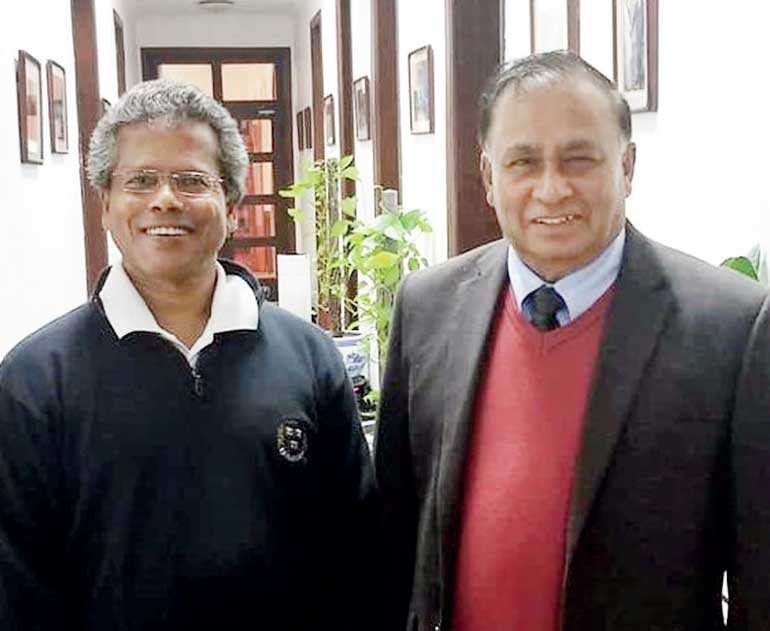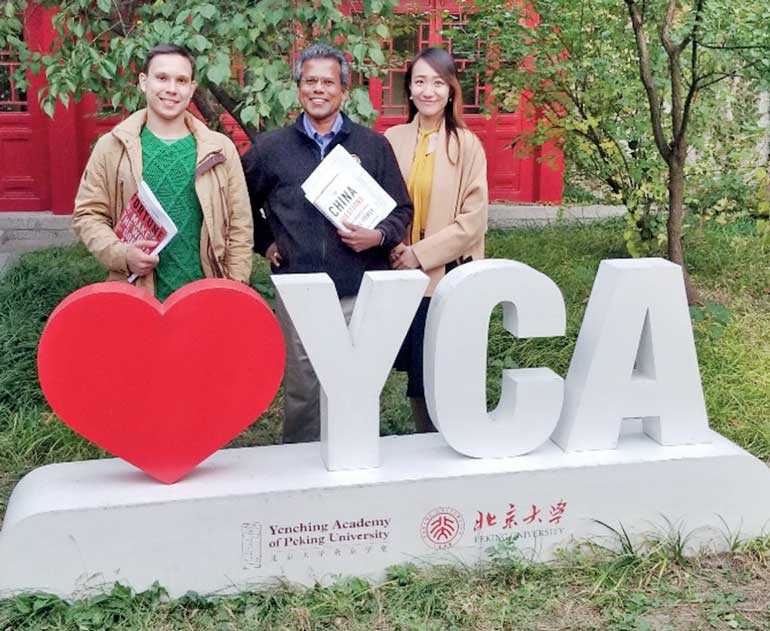Friday Feb 27, 2026
Friday Feb 27, 2026
Wednesday, 21 November 2018 00:00 - - {{hitsCtrl.values.hits}}


Beijing: Harvard-trained scholar Dr. Patrick Mendis joined the prestigious Yenching Academy of Peking University as a distinguished visiting professor of Sino-American relations.
Born in Polonnaruwa, Prof. Mendis began his journeyed from a mud house to the White House and then to international diplomacy, said Sri Lankan Ambassador to China Dr. Karunasena Kodituwakku.
Prof. Mendis was an award-winning first-class honors graduate of the University of Sri Jayewardenepura when Dr. Kodituwakku was its Vice Chancellor.
In his honour, the Faculty of Management Studies and Commerce at the university has established ‘The Dr. Patrick Mendis Prize’ presented to an outstanding graduate each year since 1994.
Prof. Mendis currently serves as a commissioner of the US National Commission for UNESCO at the Department of State in Washington. It was an appointment made by the Obama administration. Previously he had worked in the United States government during the Reagan, Clinton and Bush administrations.
A fellow of the World Academy of Art and Science, Prof. Mendis has travelled to and worked in more than 125 countries, all of China’s provinces and every state in America. He brings “a wide range of government experiences as a former American diplomat, United States Senate staffer and NATO-Pacific Commands military professor in Japan and South Korea . . . [in addition to] his international experience in the World Bank and the United Nations,” the Yenching Academy said in a statement.
An executive leadership alumnus of the Harvard Kennedy School of Government, he later served as a Rajawali senior fellow of the Kennedy School’s Ash Center for Democratic Governance and Innovation as well as a research associate of the Fairbank Center for Chinese Studies at Harvard. An advisor to the Harvard International Review, Prof. Mendis also established the ‘Millennials Award for Outstanding Leadership and Service’ at Harvard University.
Trained as a Confucius fellow of China, Prof. Mendis is a senior fellow and academic adviser to the Pangoal Institution, a global think-tank in Beijing. He has lectured at over 25 Chinese universities and academies, including Anhui, Guangdong, Hunan, Fudan, Nanjing, Peking, Renmin, Shandong, Tsinghua, Tongji, Wuhan, Xi’an and Zhejiang Universities as well as the Shanghai Academy of Social Sciences and the Chinese Academy of Social Sciences.
Prof. Mendis currently teaches a postgraduate seminar on the International Political Economy of Sino-American Relations at Peking University and lectures at Renmin and Tsinghua Universities in Beijing.
At his seminar “Yenching scholars examine the co-evolution of the Chinese and American political economies and evolving bilateral relations, with special reference to governing philosophies that seemingly point to universal values in humanity” highlighted by Peking University. Prof. Mendis engages students in debates, role-playing exercises and “trade-war” simulation to gain critical thinking and real-world experiences in the classroom setting.
Modelled after the Rhodes Scholarship program at Oxford University in England, the Yenching Academy offers a prestigious, interdisciplinary MA Program in China Studies taught primarily in English. The academy brings together about 125 exceptional Chinese and outstanding international students from more than 40 different countries each year, who become full-time students of Peking University.
The scholars participate in classroom learning, field study tours and self-designed research trips.
The Yenching Academy provides a generous scholarship to all admitted students, covering tuition fees, a travel stipend for one round-trip journey between each scholar’s home base and Beijing, campus accommodation and living costs at Peking University.
(This article originally appeared in the Asian American Press)